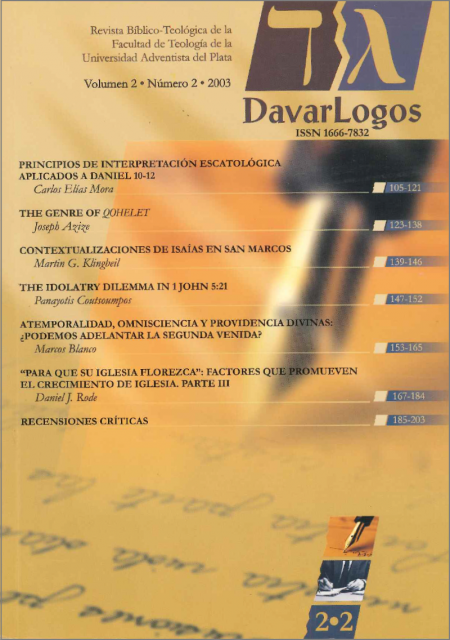ATEMPORALIDAD, OMNISCIENCIA Y PROVIDENCIA DIVINAS: ¿PODEMOS ADELANTAR LA SEGUNDA VENIDA?
Resumen
La esperanza en la segunda venida de Cristo es una enseñanza capital de la Iglesia Adventista. Sin embargo, al considerar la causa de su “demora”, hay al menos dos posiciones mutuamente excluyentes. Algunos creen que Jesús no ha venido todavía porque está esperando que su pueblo se consagre y testifique diligentemente; es decir, creen que su pueblo es el responsable de la demora. En contraposición, otros sugieren que Jesús regresará solamente cuando él lo disponga, y que no hay nada que se pueda hacer para apresurar o demorar el momento fijado para su venida. Esta investigación explicitará y evaluará el concepto que cada una de las posiciones presenta con respecto a la omnisciencia y la providencia divinas, enfatizando los presupuestos que fundamentan cada postura. Además, se presentará una posición que intentará resolver esta tensión.
Abstract
The hope of the second coming of Christ is one of the main teachings of the Seventh-day Adventist Church. However, when considering the reason of his “delay,” there are—at least—two mutually excluding positions. Some believe that Jesus has not yet come because He is waiting for His people to diligently consecrate themselves and witness; in other words, they believe that the responsibility for the delay lies with the human component. On another hand, some suggest that Jesus will return only when He decides to do so, and that there is nothing to be done in order to hasten or delay the moment fixed for His coming. This study seeks to understand and evaluate the underlying concepts of each position regarding the divine omniscience and providence, emphasizing the presuppositions that justify each position. Additionally, a third position that intends to resolve this tension, will be introduced.





